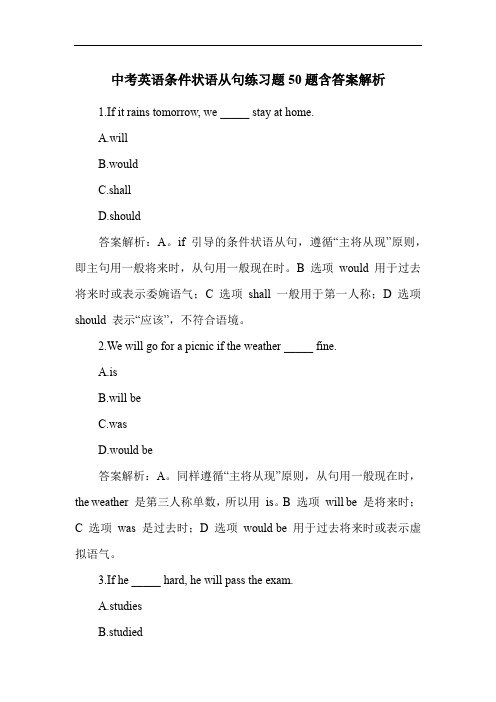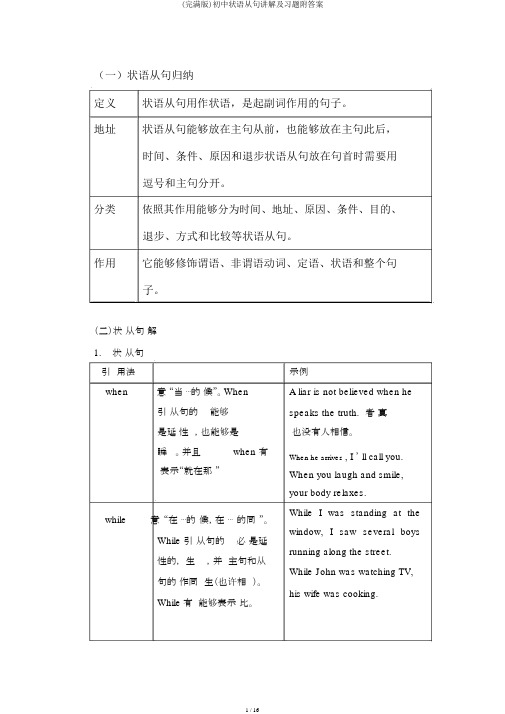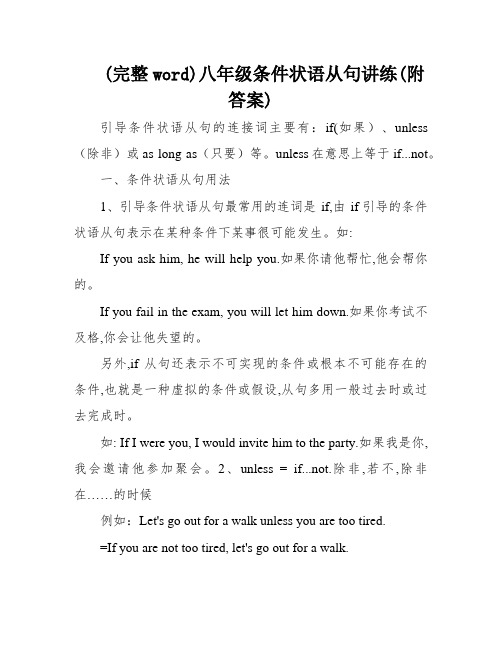初中条件状语从句(附答案)(最新整理)
最新状语从句中考经典题型带答案(word)

最新状语从句中考经典题型带答案(word)一、初中英语状语从句1.---Today, many people are in sub-health(亚健康), why?---Yes. They are so tired long time ________ they are busy with their work and exercise little every day.A.because B.until C.though D.or【答案】A【解析】【详解】句意:——今天,许多人处于亚健康状态,为什么?——是的。
他们长时间很累,因为他们忙于工作,每天很少锻炼。
考查连词辨析。
because因为,表原因;until直到,表时间;though尽管,表让步;or或者,表转折。
本句是原因状语从句,前果后因;根据句意结构和语境,可知选A。
2._______riding shared bikes is an easy way to travel, it also causes some problems. A.Although B.If C.Until【答案】A【解析】【详解】句意:虽然骑共享单车是一种简单的旅行方式,但也会引起一些问题。
A. Although尽管,虽然;B. If如果;C. Until直到。
根据下文it also causes some problems.可知上文是Although 引导的让步状语从句。
根据题意,故选A。
3.We don't know the love of our parents _______ we become parents ourselves one day. A.untilB.afterC.whenD.since【答案】A【解析】句意:直到有一天我们成为父母,才知道父母的爱。
本题考查连词。
A. until到…为止,在…以前; 直到…才;B. after在…以后;C. when当···时候;D. since自从; 从…以来;Not until 直到···才···;不到···不···,是固定搭配,故选A。
(完整)初中英语状语从句讲解、练习与答案

状从句状从句用来修主句中的,副和形容的从句叫状从句。
根据其含状从句可分状从句,地点状从句,条件状从句,原因状从句,果状从句,比状从句,目的状从句,步状从句。
1. 状从句(1)状从句常用when, as, while, before, after, since, till, until, as soon as 等来引。
例如:It was raining hard 〔rain hard下大雨〕when got to school yesterday.While he was doing his homework, the telephone rang.As he walked along 〔沿着走〕the lake, he sang happily.He had learned a little Chinese before he came to China.After he finished middle school, he went to work in a factory.(2)在状从句里,通常不用将来,用在表示将来的作或状。
例如:I ’ ll ring you up as soon as I get to New York.I will tell him everything when he comes back.He won’ t believe it until he sees it with his own eyes.(3)在有 till 或 until 引的状从句的主从复合句里,如果主句用肯定式,其含是“一直到⋯⋯〞,只能用延性。
如果主句用否认式,其含是“直到⋯⋯ 才⋯⋯〞,“在⋯⋯以前不⋯⋯〞 , 可用瞬。
例如:The young man read till the light went out〔熄〕.Let ’ s wait until the rain stops.We won’ t start until Bob comes.Don’ get off 〔从下来〕until the bus stops.【Till 是指直到某一特定事件生的候,而在那个刻之后,事情或状况仍将持。
中考英语条件状语从句练习题50题含答案解析

中考英语条件状语从句练习题50题含答案解析1.If it rains tomorrow, we _____ stay at home.A.willB.wouldC.shallD.should答案解析:A。
if 引导的条件状语从句,遵循“主将从现”原则,即主句用一般将来时,从句用一般现在时。
B 选项would 用于过去将来时或表示委婉语气;C 选项shall 一般用于第一人称;D 选项should 表示“应该”,不符合语境。
2.We will go for a picnic if the weather _____ fine.A.isB.will beC.wasD.would be答案解析:A。
同样遵循“主将从现”原则,从句用一般现在时,the weather 是第三人称单数,所以用is。
B 选项will be 是将来时;C 选项was 是过去时;D 选项would be 用于过去将来时或表示虚拟语气。
3.If he _____ hard, he will pass the exam.A.studiesB.studiedC.will studyD.would study答案解析:A。
“主将从现”,从句用一般现在时,he 是第三人称单数,studies 正确。
B 选项studied 是过去时;C 选项will study 是将来时;D 选项would study 用于过去将来时或表示虚拟语气。
4.I will go shopping with you if I _____ free.A.amB.will beC.wasD.would be答案解析:A。
“主将从现”,从句用一般现在时,I 后面用am。
B 选项will be 是将来时;C 选项was 是过去时;D 选项would be 用于过去将来时或表示虚拟语气。
5.If she _____ early, she can catch the bus.A.gets upB.got upC.will get upD.would get up答案解析:A。
(完整版)初中状语从句讲解及习题附答案

(一)状语从句归纳定义状语从句用作状语,是起副词作用的句子。
地址状语从句能够放在主句从前,也能够放在主句此后,时间、条件、原因和退步状语从句放在句首时需要用逗号和主句分开。
分类依照其作用能够分为时间、地址、原因、条件、目的、退步、方式和比较等状语从句。
作用它能够修饰谓语、非谓语动词、定语、状语和整个句子。
(二)状从句解1.状从句引用法when意“当⋯的候”。
When引从句的能够是延性,也能够是瞬。
并且when 有表示“就在那”while意“在⋯的候,在⋯ 的同”。
While 引从句的必是延性的,生,并主句和从句的作同生(也许相)。
While有能够表示比。
示例A liar is not believed when he speaks the truth.者真也没有人相信。
When he arrives , I’ll call you. When you laugh and smile, your body relaxes.While I was standing at the window, I saw several boys running along the street.While John was watching TV, his wife was cooking.as意“一⋯ 一⋯”。
As 引的作是延性的,生短,一般用于主句和从句作同生; as 也能够一前一后。
after意“在⋯此后”。
表示主句作生在从句作此后。
主句与从句的作关系与before 引的从句相反。
before意“在⋯从前”。
引的从句不用否定形式的,并且当 before 引的从句位于主句此后,有成“就,才”。
当主句用将来,从句是用在;若是 before 引的从句用的是去,主句多用去完成,以便体作的先后。
till意“直到”。
一般情况下能够和 until 互。
若是主句中的是瞬,必用否定形式;若是主句中的是The writer was angry as he was travelling on a train to London because someone had invaded his “ space ”.He smiled as he stood up.With many hungry visitors waiting, don’stay too long at your table after you have finished.If an early exit is necessary, you can leave after a scene is over.You can ’ t watch TV before you finish your homework.Before it ended, the theatrewas almost empty.My father had left for Canada just before the letter arrived.She didn ’event know that it was an earthquake till she saw a shaking ( moving from side to side) light.The fireman worked very hard延性,用必定和否定形式都能够,但表达的意思不相同。
八年级条件状语从句讲练(附答案)

8年级条件状语从句一、If引导的条件句*引导条件状语从句最常用的连词是if。
if 引导的条件句有真实条件句和非真实条件句两种(非真实条件句会在以后的虚拟语气中阐述),其引导的真实条件状语从句表示在某种条件下某事很可能发生。
1、“if从句(一般现在时)+主句(一般现在时)”的条件句----表达真理或事实(动作必然发生)。
If you heat ice, it turns into water.如果你加热冰,它就会变成水。
If you put suger into water, it disappears.如果你把糖放进水里,它就会溶解。
2、“if从句(一般现在时)+主句(一般将来时)”的条件句----谈论可能发生的的事情。
If it rains tomorrow, we’ll stay at home.如果明天下雨,我们会呆在家里。
If I don’t hear from him, I won’t go. 如果没接到他的通知,我不会去。
【注】这类条件句主句部分还可以用情态动词,如I may buy a car if I pass the driving test.如果通过驾驶考试,我可能会买一辆车。
If you go to another country, you must obey the local laws.如果你去另一个国家,就必须遵守当地的法律。
3、有时if引导的条件句可以与“祈使句,and/or…”相互转换,If you don’t hurry up, you will miss the bus.=Hurry up, or you will miss the bus.快点,否则你会错过这趟车。
If you use your head, you’ll find a way.=Use your head, and you will find a way.动动脑子的话,你就会想出办法。
二、unless引导的条件状语从句unless意为“除非、如果不”,用来引导否定意义的条件句,等于“if…not…”Let's go out for a walk unless you are too tired.= If you are not too tied, let's go out for a walk. 我们出去散步吧,除非是你太累。
英语中考专项条件状语从句

英语中考专项条件状语从句第一:条件状语是在句子中用来表达某种条件或前提的短语或从句。
它们通常用来描述一个事件或情况发生的条件。
条件状语可以使用各种不同的词或短语,以下是一些常见的条件状语及其定义:1. If(如果):表示假设条件,并指明某事可能发生的条件。
例句:If it rains, we will stay at home.(如果下雨,我们将待在家里。
)2. Unless(除非):表示除非某个特定条件成立,否则某事将发生。
例句:I won't go out unless it stops raining.(除非停止下雨,否则我不会出去。
)3. As long as(只要):表示只要某个条件得到满足,就会发生某事。
例句:You can stay here as long as you keep quiet.(只要保持安静,你可以在这里待着。
)注意:紧跟着引导词的是从句,另一部分是主句。
1)引导词if:(如果当然,我可以给您提供三个使用引导词"unless"的例子,并对每个例子进行详细说明:2)希望以上解释对您有所帮助!如果您还有其他问题,请随时提问。
)好的,以下是三个使用引导词"if"的例子,并对每个例子进行详细说明:1. If I work hard, I will succeed.这个句子中的主句是一般将来时态(will succeed),从句是一般现在时态(I work hard)。
条件状语"If I work hard"表示假设或前提,指出只有当我努力工作时,才会取得成功。
主句表达了一个结果,即未来的成功。
因此,这个句子传达了如果我努力工作,我将会成功的意思。
2. If it rains, we can't go for a picnic.这个句子中的主句是含有情态动词的一般现在时态(can't go),从句是一般现在时态(it rains)。
(完整word)八年级条件状语从句讲练(附答案)

(完整word)八年级条件状语从句讲练(附答案)引导条件状语从句的连接词主要有:if(如果)、unless (除非)或as long as(只要)等。
unless在意思上等于if...not。
一、条件状语从句用法1、引导条件状语从句最常用的连词是if,由if引导的条件状语从句表示在某种条件下某事很可能发生。
如:If you ask him, he will help you.如果你请他帮忙,他会帮你的。
If you fail in the exam, you will let him down.如果你考试不及格,你会让他失望的。
另外,if从句还表示不可实现的条件或根本不可能存在的条件,也就是一种虚拟的条件或假设,从句多用一般过去时或过去完成时。
如: If I were you, I would invite him to the party.如果我是你,我会邀请他参加聚会。
2、unless = if...not.除非,若不,除非在……的时候例如:Let's go out for a walk unless you are too tired.=If you are not too tired, let's go out for a walk.Unless it rains, the game will be played.除非下雨,比赛将照常进行。
3、so/as long as只要例句;You may borrow my book as long as you keep it clean.只要你保持干净,你可以借我的书。
So long as you’re happy, it doesn’t matter what you do.只要你高兴,你做什么都没有关系。
二、时态问题在条件状语从句中,要注意“主将从现”的规定,即主句用一般将来时,从句用一般现在时表示将来时。
例句:I will come to see you if I have time.我有时间,我就来看你。
初中英语状语从句试题(有答案和解析)及解析

初中英语状语从句试题(有答案和解析)及解析一、初中英语状语从句1. you must go and play football,at least wait until school is over.A.If B.Whether C.Unless D.So that【答案】A【解析】【详解】句意:如果你必须去踢足球,至少等到放学.A如果.B是否.C除非.D以便.结合语境"___你必须去踢足球,至少等到放学.".可知,用if引导条件状语从句.意思是"如果"。
故选A.2.— When did you go to bed last night?— ____________ I finished my homework.A.Until B.Not until C.When D.While【答案】B【解析】not …until 表示直到…才,与短暂性动词连用,故选B3.You'd better get home earlier today we can go out for a big meal.A.in order to B.such that C.so that D.in order【答案】C【解析】句意:你最好今天早点回家,这样我们就可以出去吃大餐了。
A. in order to 为了,后跟动词原形;B. such that没有此用法;C. so that为了,引导目的状语从句;D. in order+that+从句,引导目的状语从句。
we can go out for a big meal表示目的的完整句子,所以使用连词词组so that。
故选:C。
4._____ the weather is fine tomorrow, we will go fishing.A.As well as B.As soon as C.As long as D.As far as【答案】C【解析】【详解】C 本题考查连词短语用法。
- 1、下载文档前请自行甄别文档内容的完整性,平台不提供额外的编辑、内容补充、找答案等附加服务。
- 2、"仅部分预览"的文档,不可在线预览部分如存在完整性等问题,可反馈申请退款(可完整预览的文档不适用该条件!)。
- 3、如文档侵犯您的权益,请联系客服反馈,我们会尽快为您处理(人工客服工作时间:9:00-18:30)。
条件状语从句讲解及练习一、考点归纳由连接词if或unless引导的状语从句叫做条件状语从句。
(注意:在含有条件状语从句的复合句中,如果主句是一般将来时态,从句要用一般现在是“主将从现原则”。
通常译作“假如,如果,除非”。
引导词:常用引导词: if , unless1.if 引导词用法学习" if " 引导的条件状语从句的用法,现在总结一下:if 条件句不一般, 几个要点记心间;条件句,放在前, 逗号要放句中间。
条件句表可能,主句多用将来时;条件句表事实,主句常用现在时。
if 引导的条件句有:真实条件句和非真实条件句两种:(1)真实条件句:表示在某种条件下某事很可能发生。
Eg:a)If you ask him, he will help you. 如果你请他帮忙,他会帮你的。
b)If you fail in the exam, you will let him down. 如果你考试不及格,你会让他失望的。
c)If it rains tomorrow, we won’t go on a picnic. 如果明天下雨,我们就不去野餐。
注意:切记紧跟着if的那句话是从句。
(2)非真实条件句是虚拟语气的一种,表示与事实相反,不可实现的条件或根本不可能存在的条件,也就是一种虚拟的条件或假设,从句多用一般过去时或过去完成时。
Eg:a)If I were you, I would invite him to the party. 如果我是你,我会邀请他参加聚会。
b)I would have arrived much earlier if I had not been caught in the traffic. 如果没有堵车,我会到的早一点儿。
c)If I were you, I would go with him. 如果我是你,我会和他一起去的。
2. unless引导词用法(1)固定搭配: unless = if...not 除非,若不,除非在……的时候。
Eg:a)You will fail to arrive there in time unless you start earlier.=If you don’t start earlier, you will fail to arrive there in time. 如果你不早点动身,你就不能及时赶到那儿。
b)Unless it rains, the game will be played.=If it dosen't rain,the game will be played. 除非下雨,比赛将照常进行。
c)Let's go out for a walk unless you are too tired.d)= If you are not too tired, let's go out for a walk经典语句:If it dosen't rain tomorrow,we will go to the zoo. 条件状语从句就是用以表示“在某种条件下,会…”二、课堂练习I 用所给词的适当形式填空1.If you ________(feel) tired, you _______________ (have) to have a rest.2. Where _______ he _________(see) the film if he ________________(have) time?3. If there __________(be) fewer trees, there _______________( be) more pollution.4. He _____________(dress) more casually if he ________________( not work) on weekends.5. If Marcia _____________(live) alone, she ___________________( keep) a pet parrot.6. Lana ________________( buy) a new dress if the old one ____________(be) out of style.7.The twins ______________(fight) if they_______________(argue).8. I ____________(have) a bake sale if I _____________(need) money for education.9. Peter _____________( send) me a beautiful souvenir if he ________________(tour) Spain.10. If Mr Green ___________(say) I am hard- working, my parents _________( feel) glad.11.I ____________(go) to the beach if it________________ ( not rain) this week.12. __________they __________( have) a match if the P.E. teacher _____________(be) busy?13.He ____(write) a letter to his grandparents if he ____(get) his report card this week.14. If she ____________(get) up late, she _____________ ( not catch) the early bus.15. Peter ________(major) in English if he ____(pass) the exams in Peking University.15.如果他到的晚了会发生什么事情?What _______________ if he _____________ late?16. 如果努力学习,你就会取得好成绩。
If you__________ _________, you ___________ good _____________.17. 他如果看电视太久了,他的父母会不高兴。
If he _________ TV too much, his parents __________ __________ unhappy.18. 如果我们为他组织生日聚会,大家都会来的。
Everyone ________________ if we _____________ a birthday party __________ him.19. 如果明天不下雨,我会和你一起去公园的。
If it __________ __________ tomorrow, I ______________ go to the park _________ you.20. 如果她睡过头了,就会旅游迟到的。
She;__________________________ the trip if she ___________________.21. 如果他有空,他会帮助你的。
If he _________________, he _________________ you.22. 如果Tom考试不及格,他就没有机会上高中了。
Tom _________have the ________to go to the ________high school if he ________ the exams.23. 你如果抄同学的作业就不能学好各门功课。
You _______ _____ good at all the subjects if you ______ the other students’ homework.II.单项选择1.If you _____ to the party, you’ll have a great time.A. will goB. wentC. goD. going2. It will be a long time ____ Peter _____ his work.A. since, has finishedB. after, finishesC. when, will finishD. before, finishes.3. What will father _____ us from Japan?A. takeB. bringC. carryD. make4. Weifang is famous ______ kites.A. forB. toC. onD. with5.I ____ her the answer if she ____me.A. can tell, will askB. will tell, will askC. would tell, askD. will tell, asks6. – What are you going to do tomorrow?--We’ll go to the library tomorrow if it ___.A. isn’t rainB. rainC. won’t rainD. doesn’t rain7.—Do you know when he will come back tomorrow?--Sorry, I don’t know. When he ____ back, I’ll tell you.A. comesB. will comeC. comeD. may come8. What will you do if you _____ to the old folk’s home visit?A. goB. wentC.goingD. will go9. If I eat ____ food, I’ll be very fat.A. too manyB. many tooC. too muchD. much too10. I’ll give the book to him if he ___ here next Sunday.A. will comeB. comesC. is comingD. came11. There ____an English film in our school tomorrow.A. is going to haveB. will haveC. is going to beD. has12. Could you tell us where ____?A. will the next Olympic Games heldB. the next Olympic Games will be heldC. would the next Olympic Games be heldD. the next Olympic Games would be held13. When my mother returned last night, I ____ a book.A. readB. am readingC. was readingD. am going to read14.What ____ you ____ when it began to rain?A. do, doB. were, doingC. are, doingD. did, do15. I’ll wake you up when he ____back.A. willB. is going to comeC. comesD. come1---5 CDBAD 6---10 DAACB 11---15 CBCBC“”“”At the end, Xiao Bian gives you a passage. Minand once said, "people who learn to learn are very happy people.". In every wonderful life, learning is an eternal theme. As a professional clerical and teaching position, I understand the importance of continuous learning, "life is diligent, nothing can be gained", only continuous learning can achieve better self. Only by constantly learning and mastering the latest relevant knowledge, can employees from all walks of life keep up with the pace of enterprise development and innovate to meet the needs of the market. This document is also edited by my studio professionals, there may be errors in the document, if there are errors, please correct, thank you!。
